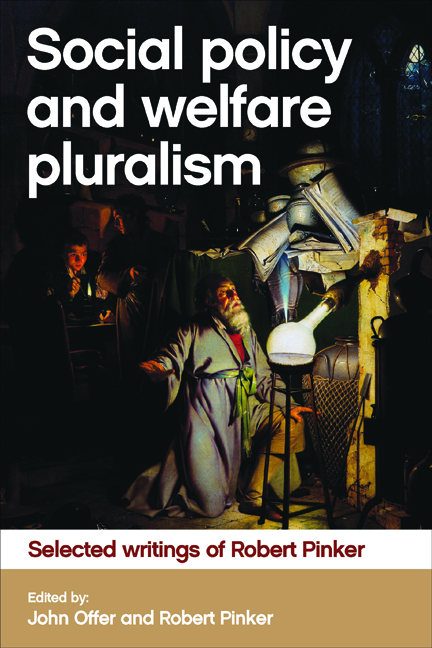Book contents
- Frontmatter
- Contents
- Acknowledgement
- Preface
- General introduction: Robert Pinker on rethinking approaches to welfare
- Introduction to Part One On social policy studies
- one The ends and means of social policy: a personal and generational perspective
- two Social theory and social policy: a challenging relationship
- three Stigma and social welfare
- four The welfare state: a comparative perspective
- five Richard Titmuss and the making of British social policy studies after the Second World War: a reappraisal
- Introduction to Part Two On social care, communities and the conditions for well-being
- six Report of the Working Party on the Role and Tasks of Social Workers: an alternative view
- seven The quest for community: from the Settlement Movement to the Griffiths Report: an historical perspective
- eight Citizenship, civil war and welfare: the making of modern Ireland
- Introduction to Part Three On welfare pluralism
- nine Golden Ages and welfare alchemists
- ten From gift relationships to quasi-markets: an odyssey along the policy paths of altruism and egoism
- eleven The experience of citizenship: a generational perspective
- twelve The right to welfare
- thirteen The prospects for social policy in the UK after the 2015 General Election
- Afterword On the post-Brexit prospects for social policy in the UK
- References
- Index
Introduction to Part Three - On welfare pluralism
Published online by Cambridge University Press: 08 April 2022
- Frontmatter
- Contents
- Acknowledgement
- Preface
- General introduction: Robert Pinker on rethinking approaches to welfare
- Introduction to Part One On social policy studies
- one The ends and means of social policy: a personal and generational perspective
- two Social theory and social policy: a challenging relationship
- three Stigma and social welfare
- four The welfare state: a comparative perspective
- five Richard Titmuss and the making of British social policy studies after the Second World War: a reappraisal
- Introduction to Part Two On social care, communities and the conditions for well-being
- six Report of the Working Party on the Role and Tasks of Social Workers: an alternative view
- seven The quest for community: from the Settlement Movement to the Griffiths Report: an historical perspective
- eight Citizenship, civil war and welfare: the making of modern Ireland
- Introduction to Part Three On welfare pluralism
- nine Golden Ages and welfare alchemists
- ten From gift relationships to quasi-markets: an odyssey along the policy paths of altruism and egoism
- eleven The experience of citizenship: a generational perspective
- twelve The right to welfare
- thirteen The prospects for social policy in the UK after the 2015 General Election
- Afterword On the post-Brexit prospects for social policy in the UK
- References
- Index
Summary
One writer has described welfare pluralism as ‘a vital, but relatively neglected, part of social policy’ (Powell, 2007: 2). Pinker, however, did not neglect it. The third section explores some of the key arguments for pluralism in social policy in the UK which Pinker has highlighted since the 1980s. In this section in particular, space considerations have meant that it is a necessity that some of the many interesting essays by Pinker on pluralism have to be summarised here rather than reprinted.
Welfare pluralism certainly pre-dated the predominantly unitarist or statecentred approach to thinking about social policy adopted in the 1940s (among important historical studies are Johnson [1985], Lewis [1992] and Finlayson [1994]). But it was never entirely eclipsed in those years either in theory or practice, being embraced by Beveridge himself (in Voluntary Action: A Report on Methods of Social Advance, published in 1948). Pinker referred to this fact in his ‘Making sense of the mixed economy of welfare’, in Social Policy and Administration in 1992. Indeed, as we now know, the idea of pluralism in welfare policy lived on to be given new emphasis detectable from the late 1970s. In 1989, Martin Knapp wrote that ‘Mrs Thatcher's governments of the 1980s brought about bigger changes to the mixed economy of welfare than there had been since the 1940s … Dyed in the wool socialists would do well to recognise the undoubted successes within this huge social experiment. Blue-rinse Conservatives should acknowledge and seek to correct the failings. The prospects for Britain in the 1990s would be rosiest if research replaced rhetoric, and honest pragmatism replaced posturing’ (1989: 252). Over 25 years later, all these judgements remain sound.
The first essay, Chapter Nine, ‘Golden Ages and welfare alchemists’, was first published in Social Policy and Administration in 1995 (Pinker, 1995b). It explores the idea of ‘Golden Age’ theories in social policy thought, and the ‘welfare alchemists’ whose visions these theories encapsulate. These are theories of the ideal society and how to realise it, whether drawn from the past or the future. Pinker argues that these grand theories are in reality ideologies.
- Type
- Chapter
- Information
- Social Policy and Welfare PluralismSelected Writings of Robert Pinker, pp. 187 - 196Publisher: Bristol University PressPrint publication year: 2017



